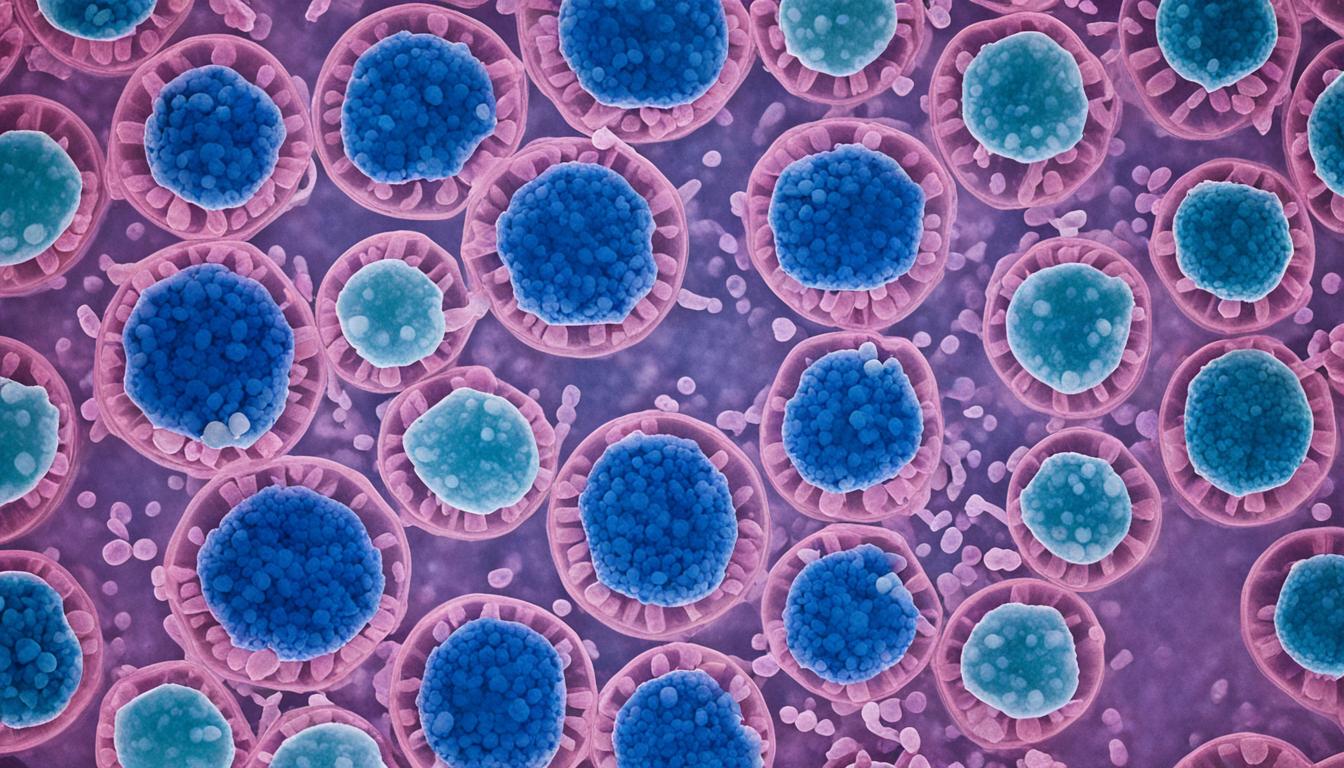Merkel cell carcinoma (MCC) is a rare and aggressive skin tumor. It mostly affects older, white men. UV exposure and a weak immune system are major risk factors. Plus, the Merkel cell polyomavirus (MCPyV) can raise the risk.
To diagnose MCC, a skin biopsy is essential. Doctors also check the sentinel lymph nodes. Treatment options include surgery, radiation, and immune therapies for the most severe cases. Scientists are constantly working to find better ways to detect and treat MCC early.
Key Takeaways
- Merkel cell carcinoma is a rare and aggressive form of skin cancer.
- MCC primarily affects elderly, white males and is associated with risk factors such as UV exposure, advancing age, and immunosuppression.
- MCC is linked to Merkel cell polyomavirus (MCPyV) infection.
- Diagnosis of MCC involves a skin biopsy, and sentinel lymph node evaluation is recommended.
- Treatment options for MCC include wide local excision, adjuvant radiotherapy, and immune-based therapies for metastatic cases.
- Ongoing research aims to improve early detection and treatment outcomes for Merkel cell carcinoma.
Understanding Merkel Cell Carcinoma: Etiology, Epidemiology, and Pathophysiology
Merkel cell carcinoma (MCC) is a rare and aggressive skin cancer. It’s essential to understand its causes and how it spreads. This knowledge helps us fight the disease better.
Etiology and Risk Factors
MCC might start from stem cells in the skin’s top layer. The main cause is the Merkel cell polyomavirus (MCPyV). This virus can change how cells grow, causing a tumor.
Risk factors include UV light, getting older, and a weak immune system. UV light can hurt skin cell DNA, making MCC more likely. Older people and those with weak immune systems are also at higher risk.
Epidemiology and Incidence
The number of MCC cases has been rising. It especially affects older white men, but anyone can get it. The disease covers a wide range of ages and groups.
Experts think viral tumors and UV light are big factors in getting MCC. Understanding who is at risk helps with preventing and treating the disease.
Pathophysiology and Tumor Progression
How MCC grows and spreads is complex. Tumors can avoid the body’s defenses and keep growing. This includes making a protein called PD-L1 that protects the cancer from immune cells.
Looking at MCC under a microscope is key to diagnosis. Tests for special proteins can confirm it’s MCC and not another type of cancer. This helps doctors know how to treat it.
Knowing how MCC forms and acts helps us fight it. Researchers and doctors use this knowledge to find better ways to prevent, find, and treat MCC.
Clinical Presentation, Evaluation, and Management of Merkel Cell Carcinoma
Merkel cell carcinoma (MCC) stands out with unique clinical signs. It needs a deep examination for the right care. Knowing how it acts, how to diagnose, and treatment choices helps doctors aim for the best results.
Symptoms
MCC shows up as a fast-growing bump. It’s usually not painful and can be red or bluish. It pops up on the skin that the sun has hit, often in the head and neck area.
Diagnosis
Doctors diagnose Merkel cell carcinoma with a skin biopsy. They take a small piece of the bump to look at closely. They also check the lymph nodes to see if the cancer has spread. This helps them know how advanced the cancer is and what treatment will work best.
Evaluation
After diagnosing Merkel cell carcinoma, a full check-up is needed. This looks at how far the cancer has spread. Tests like CT scans or MRIs help with this. They also look at the patient’s health to pick the right treatment plan.
Treatment
Treatment for MCC varies by how advanced it is. Localized cancer is often treated by removing the tumor. Radiotherapy might follow to kill any dropouts. If lymph nodes are involved, they might be taken out or treated with radiation. For cancer that has spread, treatments such as chemotherapy, immunotherapy, or surgery might be used.
Conclusion
Merkel cell carcinoma is a rare and aggressive skin cancer. It’s hard to diagnose and treat. Finding it early and treating it correctly are key to better patient outcomes.
New treatments are showing promise, which is good news. They improve the chances of surviving this cancer. Public knowledge and ongoing research are also vital to fight it.
The medical field is working together to fight Merkel cell carcinoma. Doctors, scientists, and others are always looking for better ways to help patients. They aim to improve treatment and care against this tough enemy.
Research is ongoing to understand this cancer better. It’s important that everyone knows about Merkel cell carcinoma. Supporting efforts to increase awareness and research funding can make a real difference.

